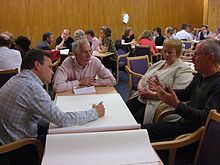User:Fbell74/sandbox

A World Café or Knowledge Café is a structured conversational process in which groups of people discuss a topic at several tables, with individuals switching tables periodically and getting introduced to the previous discussion at their new table by a "table host". A café ambience is created in order to facilitate conversation. In some versions, a degree of formality is retained to make sure that all participants gets a chance to speak.[1] Alternatively, the café concept can be taken more literally, potentially with everyone talking at once. As well as speaking and listening, individuals may be encouraged to write or doodle on the tablecloth so that when people change tables, they can see what previous members have written, as well as hearing the table host's view of what has happened to that point. Although pre-defined questions are agreed at the beginning, outcomes or solutions are not decided in advance.[2][3] An underlying assumption of World Café events is that collective discussion can shift people's conceptions and encourage collective action.[4]
The World Café originated at the home of Juanita Brown and David Isaacs in 1995 when a "large circle" conversation became disrupted by rain.[5]
In the version used by David Gurteen (who uses the term "Knowledge Café"), the small group discussions are not led by a facilitator, and no summary is captured for subsequent feedback to the group - the aim is to maximise time spent in conversation, and so time spent on table presentations is minimised.[6]
World Café events require at least twelve participants, but there is no upper limit. The largest number of people documented at a single World Cafe event was in excess of 10,000, in Tel Aviv, in 2011.[7] World Cafés have been used by a range of organizations.[8][9][10][11]
See also[edit]
- Joscha Remus, founder of the first Knowledge Cafe in Germany, in 2007
References[edit]
- ^ Slocum, Nikki. Participatory Methods Toolkit: A Practitioner's Manual Section: "Method: The World Café". A joint publication of the King Baudouin Foundation and the Flemish Institute for Science and Technology Assessment (viWTA). ISBN 90-5130-506-0
- ^ Christopher M. Bache (28 August 2008). The Living Classroom: Teaching and Collective Consciousness. SUNY Press. ISBN 978-0-7914-7646-8.
- ^ Merianne Liteman; Sheila Campbell; Jeffrey Liteman (14 July 2006). Retreats That Work: Everything You Need to Know About Planning and Leading Great Offsites. John Wiley & Sons. pp. 48–. ISBN 978-0-7879-8643-8.
- ^ Sarah Lewis (16 March 2011). Positive Psychology at Work: How Positive Leadership and Appreciative Inquiry Create Inspiring Organizations. John Wiley & Sons. ISBN 978-1-119-99621-7.
- ^ The World Café. "History".
- ^ Gurteen, David (2003–2008). "How to run a Knowledge Café". Gurteen. Retrieved 15 February 2017.
{{cite web}}: CS1 maint: date format (link) - ^ Mauro Galluccio (4 December 2014). Handbook of International Negotiation: Interpersonal, Intercultural, and Diplomatic Perspectives. Springer. pp. 164–. ISBN 978-3-319-10687-8.
- ^ "World Café Powerpoint". www.democraticdialoguenetwork.org. UNDP. Retrieved 16 December 2014.
- ^ Margaret J. Wheatley; Deborah Frieze (11 April 2011). Walk Out Walk On: A Learning Journey into Communities Daring to Live the Future Now. Berrett-Koehler Publishers. pp. 192–. ISBN 978-1-60509-733-6.
- ^ Stern, Townsend, Rauch, Schuster, Thomas, Andrew, Franz, Angela (2013). Action Research, Innovation and Change Across Disciplines:: International Perspectives Across Disciplines. Routledge. ISBN 9781317916079. Retrieved 15 December 2014.
{{cite book}}: CS1 maint: multiple names: authors list (link) - ^ Peter M. Senge (31 March 2010). The Fifth Discipline: The Art & Practice of The Learning Organization. Crown Publishing Group. pp. 362–. ISBN 978-0-307-47764-4.
Further reading[edit]
- "The Knowledge Café–A Knowledge Management System and Its Application to Hospitality and Tourism". Journal of Quality Assurance in Hospitality & Tourism. Volume 3, Issue 3-4, 2002. pp. 75-88.
- The Complete Guide to Knowledge Management. John Wiley & Sons. pp. pt112–114.
- The World Café. Berrett-Koehler Publishers. pp. 96-98.
- ICIE 2015 3rd International Conference on Innovation and Entrepreneurship. Academic Conferences Limited. pp. 191–193.
- The Future of Knowledge. Routledge. pp. 146–148.
- Capitalizing on Knowledge. Routledge. pp. 125–.
- Powerful Professional Development. Corwin Press. pp. 83–.
External links[edit]
